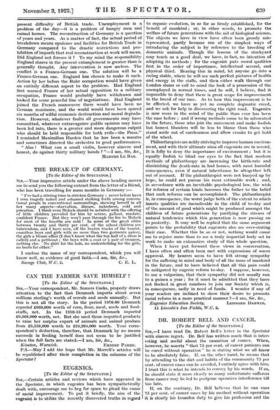EUGENICS,
[To the Editor of the SPECTATOR.]
SIR,—Certain articles and reviews which have appeared in the Spectator, in which eugenics has been sympathetically dealt with, encourage me to beg for space to plead the cause of racial improvement. To put it briefly, the aim of the eugenist is to utilize the recently discovered truths in regard to organic evolution, in so far as firmly established, for the benefit of mankind ; or, in other words, to promote the welfare of future generations with the aid of biological science. The objects we have in view have often been grossly mis- represented, partly because one of the simplest ways of introducing the subject is by reference to the breeding of domestic animals. Though the lessons of the stockyard may teach us a good deal, we have, in fact, no intention of adopting its methods: for the eugenist puts moral qualities first in the order of importance, intellectual second, and physical third. Bearing this in mind, let anyone go into a racing stable, where he will see such perfect pictures of health and energy in the stalls, and then either walk through our London slums or call to mind the look of a procession of the unemployed in normal times, and he will, I believe, find it impossible to deny that there is great scope for improvement in the breed of our race. As to how this improvement is to be effected, we have as yet no complete dogmatic creed, and we ask for help in discovering the right road. Eugenics is now more in the mind of the public than ever has been the case before ; and if wrong methods come to be advocated in the future, those who join the movement and make foolish but honest blunders will be less to blame than those who stand aside out of carelessness and allow cranks to get hold of the wheel.
Philanthropists are nobly striving, to improve human environ- ment, and with their ultimate aims all eugenists are in accord.
It is folly to deny the importance of environment ; but it is equally foolish to blind our eyes to the fact that modern methods of philanthropy are increasing the birth-rate and diminishing the death-rate in bad homes, with most harmful consequences, even if natural inheritance be altogether left out of account. If the philanthropist were not buoyed up by hope, he could not pursue his most estimable work ; and, in accordance with an inevitable psychological law, the wish for reforms of certain kinds becomes the father to the belief that such reforms can be accomplished. The philanthropist is, in consequence, the worst judge both of the extent to which innate qualities are ineradicable in the child of to-day and of the amount of good which might be produced amongst the children of future generations by purifying the stream of natural tendencies which this generation is now passing on to posterity. It may well be replied that the same argument points to the probability that eugenists also are over-stating their case. Whether this be so or not, nothing would cause me to rejoice more than to see a truly impartial body set to work to make an exhaustive study of this whole question.
When I have put forward these views in conversation, I have often and often been met with expressions of warm approval. My hearers seem to have felt strong sympathy for the suffering in mind and body of all the mass of mankind in the future, and to have believed that all this pain could be mitigated by eugenic reform to-day. I suppose, however, to use a vulgarism, that their sympathy did not usually run to a guinea a year ; for it must be admitted that they have not flocked in great numbers to join our Society which is, in consequence, sadly in need of funds. I wonder if any of your readers are inclined to show their desire to promote racial reform in a more practical manner Y—I am, Sir, &c., Eugenics Education Society, LEONARD DARWIN. D. Lincoln's Inn Fields, W.C. 2.


























































 Previous page
Previous page